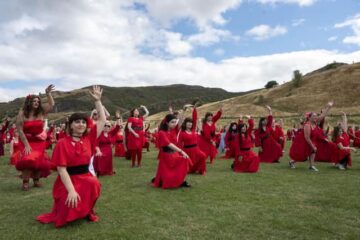If you can meet with Triumph and Dysarthria, and treat those two impostors just the same … why speech therapy and singing are so helpful in the early stages of a Parkinson’s diagnosis.
Please forgive the silly intro. From the great grey-green greasy Limpopo, to The Jungle Book, to If, and to exceedingly good cakes, I love Kipling. But dysarthria is no joke. The cruel thief Parkinson’s steals voices and dysarthria is its getaway driver.
“Dysarthria is a motor-speech disorder. It happens when you can’t coordinate or control the muscles used for speech production in your face, mouth, or respiratory system. It usually results from a brain injury or neurological condition, such as a stroke.” (Healthline)
Dysarthria can make speech slurry, slow, and quiet. I know two people robbed of their voices by this villain. One of them, Tessa, has had Parkinson’s for 16 years. About four years ago she noticed that she was unable to speak slowly or clearly enough to make herself understood. The problem has gradually worsened as the volume of her speech also deteriorated and she has to shout to make herself heard. She says:
“One of the main problems is that, to me it sounds as though I’m speaking much louder than I really am. This is common among people with Parkinson’s.
I referred myself to a very helpful speech therapist and had a six-week intensive course of voice exercises (Lee Silverman’s Voice Treatment, LSVT). This involved making loud ‘Ahhh’ noises every day and showed me that I could speak more clearly if I really tried. It was also helpful to talk to someone who understood.
The situation now is that while younger people seem to have little trouble hearing and understanding me, older folk who are generally slightly deaf, can’t make out what I’m trying to say. This includes my partner Frank and causes a lot of merriment when we misunderstand each other. Once I said, ‘that was a tremendous effort’ and Frank heard it as ‘a demented heifer’!
It also causes frustration when I just can’t get across what I need to say. I can no longer write clearly either but do occasionally resort to using the notepad on my phone to write down things, especially complicated explanations.
I do find that I rarely join in conversations when in a group of people, as I can’t make myself heard so don’t even bother trying any more. This has been particularly noticeable recently with Zoom meetings and of course face masks don’t help. It can make me feel very isolated at times.
I would definitely recommend anyone who is worried about their speech to get help but also keep a sense of humour and just get on the best you can.”
Use it or lose it
I’m determined not to let my voice go. It’s use it or lose it – the earlier people with Parkinson’s can start treatment after diagnosis the better. So, when COVID allows, I have been rocking up to the Infirmary in Carlisle to spend 40 minutes yakking loudly and clearly to my lovely speech therapist Katie.
Katie invited me to write down a list of ‘functional phrases’ – things that I say a lot in the week. They include:
- “Are you going into Penrith later?”
- “What time is Countryfile on?”
- “Do you want red or white?”
Not written down, but frequently uttered in a loud voice, are the expletives I use when frustrated with fiddly packaging.
Your occupation may call for other vocabulary – a shepherd, for example, may spend more time talking to their collie than to people. Their functional phrases might include:
- “Come bye”
- “Away to me”
- “Lie down”
- “That’ll do”
Katie also asks me to make loud ‘Ahhh’ noises in the middle, top and bottom of my vocal range, and so far she is very pleased with progress.
Belting it out
Singing is brilliant speech therapy, but if your choir is still being cautious about the amount of water vapour in the air, and rehearsals are superspreader events, being together isn’t so much fun. So shut the windows, turn up the volume, and belt it out at home. A number of tunes do it for it me here, but my favourite is Bill Withers’ Lovely Day.
On my wedding day in 1980, my brother Chris managed to get a request played on Radio 2 Breakfast show. Ray Moore, the DJ, assumed Chris was short for Christine, not Christopher, so he referred to him as ‘she’ and ‘her’ throughout. When I met up with Chris later, I said ‘Never mind, Chris – always the bridesmaid, never the bride.” The tune they played that morning was Lovely Day. And it was a good choice, because it was a lovely day.
For long notes: I use this tune now as part of my speech therapy – Bill holds the longest note for 18 seconds, and I see how far I can keep up with him. If you listen carefully, it’s also a tribute to our partners and carers.
“When the day that lies ahead of me
Seems impossible to face
When someone else instead of me
Always seems to know the way
Then I look at you
And the world’s all right with me
Just one look at you
And I know it’s gonna be
A lovely daaaaaaaaaaaaaaaaaaaaaaaaaaaaaaaaaaaaay”
For high notes: Loving You, by Minnie Riperton.
For range: The bit at the end of Big Yellow Taxi when Joni Mitchell covers several octaves and laughs manically.
For low notes: Wandrin’ Star by Lee Marvin, Ol’ Man River by Paul Robeson “You getta little drunk and you land in JA-
YUL
For volume: Pinball Wizard, by The Who “That deaf dumb and blind kid SHO’ PLAYS A MEAN PINBALL! And of course, Shout!, by Lulu
Classical choices
Maybe these popular tunes aren’t to your taste and you’d like something a bit more bel canto than con belto. The best person for me to ask is my brother-in-law, David Parry, conductor, writer and operatic vocal coach. He recommends:
For long notes: Depuis le jour, Louise (Charpentier); Amor ti vieta, Fedora (Giordano)
For high notes: Queen of the Night’s second aria, Der Hölle Rache, Magic Flute (Mozart); The Bell Song, Lakmé (Delibes)
For low notes: Sarastro’s first aria, In diesen heil’gen Hallen, Magic Flute (Mozart); Ol’ Man River, Show Boat (Kern)
For range: Fiordiligi’s first aria, Come scoglio, Così fan tutte (Mozart)
For volume: Vesti la giubba, Pagliacci (Leoncavallo)
For pretty well everything: Nessun dorma, Turandot (Puccini) and almost anything else from Pavarotti’s greatest hits disc.
Wow. Thank you David, some really powerful tunes here.
Play > Lovely day > Bill Withers



4 Comments
Richard · 13 December 2021 at 10:51 am
This is a great post and I shall try it out. Everyone needs to keep their voice healthy. Quite a repertoire to get through! I feel a Spotify playlist coming on…
I am wondering if location is important. For example, I used to practise/road-test speeches by delivering them in a local cow field (over time the cows became quite keen on my use of dramatic irony and litotes). This was because I wanted infinite scope (I could speak very loudly) and no echo (I could hear cadences), so my clarity and rhythm had to be spot on. The reverse, of course, in singing in the bath (Nessun Dorma a favourite.) So, my musing is on whether this factor might play a role in the use of speech therapy in this context.
Rob · 13 December 2021 at 3:42 pm
As so often, Ali, there’s such a lot I can relate to in this excellent post. Sadly there is no such voice therapy available in Leeds, and I am still waiting to see a speech therapist. But I do (pretend to) sing in a band!
Annette · 13 December 2021 at 11:57 pm
Excellent post I had and was able to great difficulty making myself heard and was able to get help which has continued to be okay enjoyed the blog very much..
Poetry in motion - ParkyTracks · 11 April 2022 at 8:00 am
[…] enjoy about parkytracks? Well, the crackling positivity and outrageous jokes and puns, for a start. “If you can meet with Triumph and dysarthria…” enough said. But I’m always learning new things as well. There’s a characteristic […]